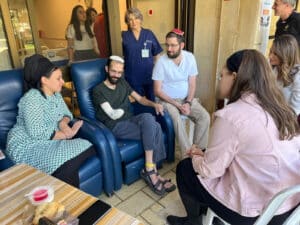Most of the haredim in Israel are being punished twice during the coronavirus crisis. On the one hand, most are abiding by the rules, while and coping with illness and death; on the other, they’re also hated and blamed by other sectors for being irresponsible.
I know many such haredim, whose children are at home, while TV reports claim that their educational institutions are open, and those who have hosted weddings with a mere 20 people and funerals with 10. Yet, when they board a bus, people look at them as if they had spent the previous evening partying with thousands.
News loops don’t show those haredim 100 times a day actually adhering to the COVID-19 lockdowns, and so it seems as though they don’t exist. But those are the haredim whom I know. In fact, I really don’t know anyone who isn’t being stringent about the regulations.
Still, the familiar argument that “only a small minority” is responsible for the bad behavior attributed to the entire haredi community—even though this is true. For years, I have been ridiculing the obsessive coverage of Jerusalem’s Mea Shearim neighborhood, which represents less than 1,000th of the haredi public. It’s a place that photographs well but doesn’t reflect the sector as a whole. But now, sadly, it’s not only Mea Shearim that’s under the spotlight. Now, it’s a whole community, which is exploited by those who want to nurture hatred and garner votes in the upcoming elections.
How is it possible, after almost a year, that there is still a minority of Jews snubbing the most basic mitzvah - the preservation of human life? Does the important and beautiful custom of gathering together at family and holiday celebrations override the simple Jewish law of saving lives?
Yes, thousands “dance” at protests outside the Prime Minister’s Residence in Jerusalem, and even more have thronged in Ben-Gurion International Airport on their way to Dubai. And, yes, there are large weddings in Arab villages. But since when has “others are also doing it” been an argument in Judaism?
How can anybody ignore hospitalized mothers, isolated grandparents and an entire country soaked in sorrow and anxiety, and celebrate as if he doesn’t care about himself or the safety of others? And why do we even need the police to enforce the law? Why are those who know very well how to be very stringent in many areas not strict or careful with the coronavirus rules?
These questions will continue to reverberate even if the extremists finally come to their senses (and I think that they might after this last week), even if restrictions are tightened and better enforced, and even if the pandemic is all over in a few months, enabling us to move on.
For some perspective, on this past Shabbat 70 years ago, on the 10th of Shevat, the young and talented Rabbi Menachem Mendel Schneerson became the Lubavitcher Rebbe - the leader of the Chabad movement - and began to spark a revolution.
Something that he responded to a woman angry with him (as the “responsible adult”) for the behavior of the Orthodox is illuminating. He answered firmly that Judaism does not belong to him, and that “religious” and “secular” are terms that we have created.
Judaism, he said, is the truth, a treasure that belongs to all of us. The responsibility for its existence rests upon your shoulders just as much as it rests upon mine. Do not jump to conclusions about the Torah from what people (who are not perfect, of course) say.
In other words, our current situation has created a distortion, both among those who’ve discarded the Torah and think they don’t have any responsibility for it, and among those who live with the sense that they are the only ones protecting it at all costs—and certain that everyone else is against them. This is simply not the healthy and natural state in which we are supposed to live.
On Mount Sinai, all of us received the Torah, and we committed to transmitting it willingly and joyfully to the next generation. This worked for thousands of years, but now something has gone wrong. We’ve entrenched ourselves. We’ve distanced ourselves. Social-media comments to the effect that gas should be poured into the yeshivahs, or haredi demonstrators who call members of the Israel Police “Nazis” consider one another enemies, but they’re actually not so different from one another.
When the situation is imbalanced, mutations like this appear. As a rabbi once told me, “When I teach Torah to a secular person, I don’t want him to become like me. I want him to be able to help himself and to help us, too. We can’t do it alone. We need everyone in this story.”
Those members of the Orthodox communities who ignore the coronavirus rules cause many other sectors to become angry and stay away. If that’s what Judaism looks like, they say to themselves, they’re not having any part of it.
The Lubavitcher Rebbe launched his great movement when he saw the Jewish world in its forlornness after the Holocaust and feared many Jews would desert their Judaism completely. He was reaching out, not turning inwards - to create an attractive, relevant Judaism, full of meaning and purpose.
He always said to Jews who spotted problems that they need to be counterintuitive, not to turn away, but to solve and repair - not to waste time complaining, but to work to make things better. It is advice that should be heeded, particularly today.
Faced with those who breach the rules, we must not turn away, but build a more responsible Jewish model with greater solidarity.
The Lubavitcher Rebbe used to say, “Don’t be a fan; be a player.” If some members of the team are messing up, don’t sit in the bleachers and curse. Jump down to the grass and join the game for a better outcome.








